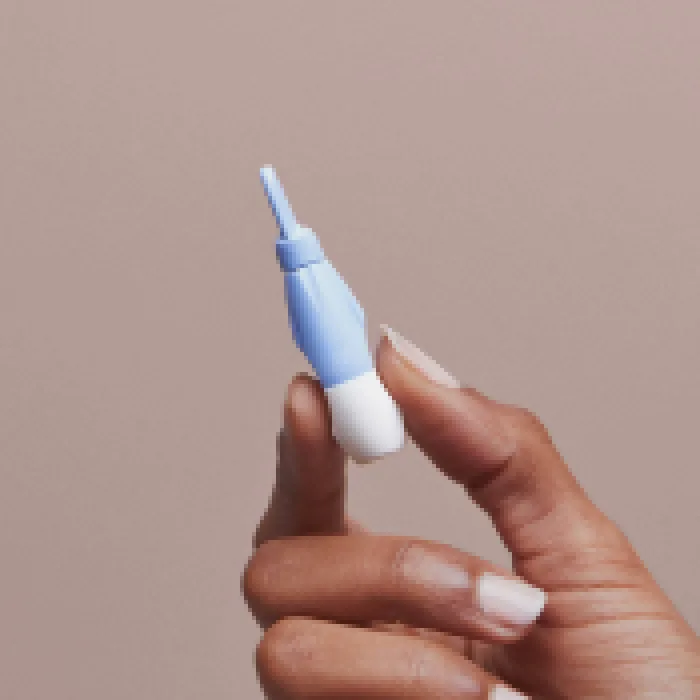Chemical pregnancy: a common experience we rarely talk about

Reviewed by Health Guide Team,
Written by Chanel Dubofsky
last updated: Jun 29, 2018
4 min read
Here's what we'll cover
The day before her period was due, Alexandra took a pregnancy test. She and her partner had been trying to get pregnant, so she was thrilled when the test revealed a strong positive. The next day, she took another one, just to be sure. It was still positive, but the pink line was slightly fainter. The day after that, Alexandra took one more test. The line was now barely visible. "Then, about five days after my period was due, I got a very, very heavy period,” she remembers. “My doctor said it was something called a chemical pregnancy."
A chemical pregnancy, also known as a biochemical pregnancy, is defined as a very early miscarriage. It's referred to as a “chemical pregnancy” because of the biochemical means of diagnosis, according to Rebecca Lee, a registered nurse (RN) in New York City. "The fertilized egg still produces enough pregnancy hormone hCG (human chorionic gonadotropin) to cause a positive result on a pregnancy test but the implantation itself is never fully completed," she says.
Chemical pregnancies occur before a person even realizes they're pregnant, around five weeks of gestation and before an ultrasound can detect a yolk sac (the first anatomical identified by within the the gestational sac by ultrasound). "Many women fail to notice a chemical pregnancy, or tend to blame it on their menstrual cycle," says Dr. Jeffrey Sternberg, founder of The Fertility Institutes. Like in Alexandra's case, chemical pregnancies present themselves as a heavy period or slightly discolored period blood.
Chemical pregnancies represent between 8-33% percent of all pregnancies
he incidence of a chemical pregnancy is 8% and 33% of all pregnancies, and 18-22% of IVF pregnancies.
Sternberg breaks down how chemical pregnancies work in the body: "An egg is fertilized by a sperm, but the egg shortly dies off as it is not fertile enough to continue with the full cycle of conception."
So, why do chemical pregnancies happen?
Lee says Chromosomal abnormalities, advanced maternal age (which the medical community defines as being over age 35), clotting disorders and thyroid issues are some possible causes. A study published in the April 2015 issue of Human Reproduction wondered if IVF affects the chemical pregnancy rate. The research focused on subjects 42 years old and younger who underwent single embryo transfer, a procedure in which one fresh and frozen embryo gets selected from a larger group and is implanted either into the uterus or fallopian tube.
When the results were compared to control subjects who attempted spontaneous conception, the likelihood of a chemical pregnancy was actually lower and not as common among those who underwent IVF. Meaning, IVF may not influence one’s likelihood of having a chemical pregnancy rate. The authors hypothesize that the opportunity to select the embryo for transfer helps eliminate the possibility that a problematic embryo results in a chemical pregnancy.
What happens now?
A's doctor told her that there was actually an upside (if it can even be called that) to her chemical pregnancy: it indicated that she could get pregnant, which A had some concerns about since she's almost 41. Dr. Mark Trolice, an MD, reproductive endocrinologist, and infertility specialist at Fertility CARE - The IVF Center and Associate Professor of OB-GYN at the University of Central Florida College of Medicine, agrees. "A biochemical pregnancy is somewhat encouraging since it shows the woman’s partner’s sperm can fertilize her egg and her uterus can allow for embryo implantation."
Though it may be emotionally difficult, there’s no scientific or medical reason why you can’t resume trying to get pregnant after a chemical pregnancy. In fact, a 2016 study by the National Institutes of Health indicates that your chances of a live birth might actually increase if you start trying again within three months of a miscarriage. The research, which was conducted between 2007 and 2011, featured 1,228 women between the ages of 18 and 40 who had experienced miscarriage before 20 weeks.
1,083 of these women were followed for six menstrual cycles and, if they became pregnant, until the outcome of their pregnancy was known. 76 percent started trying to get pregnant again within three months of their miscarriages, and the study found that they were more like to get pregnant than the folks who waited longer (69 percent versus 51 percent) and to have a pregnancy leading to a live birth (53 percent versus 36 percent). The researchers did not observe any increase in the risk of pregnancy complications in the group who immediately attempted conception.
If you're younger than 30, Trolice says your risk of a late-term miscarriage is around 10 percent and each miscarriage you have adds to the likelihood that you'll have another one. But these statistics and facts might not be the case with chemical pregnancies. There is not enough research, according to Trolice, to determine whether or not a chemical pregnancy makes it more likely that you'll have another.
But multiple chemical pregnancies could indicate a genetic error. When this happens with patients, Sternberg often suggests genetic testing for both partners. If you have hormone deficiencies or a thyroid condition, seeking treatment will decrease your odds of having a chemical pregnancy. There is a relationship between certain genetic clotting disorders (like MTHFR C677T, which impacts the production of folic acid) and spontaneous fetal loss. If you are having recurrent chemical pregnancies, you may want to ask your provider to investigate.
In general, Sternberg advises paying attention to nutrition, making sure you're getting enough rest, taking a prenatal vitamin, and avoiding exposure to environmental and occupational hazards when possible (like lead and the fumes emitted at nail salons).
Feel your feelings
Because a chemical pregnancy happens so early and you might not even know you even experienced one, it’s common to feel like you don't have the right to talk about it or mourn it. You may even blame yourself. "There is nothing the mother did to cause the chemical pregnancy and there was no way to prevent it from happening," says Lee. Trolice adds that the individual needs appropriate support from her partner and loved ones.
A miscarriage is a loss, no matter when it happens during a pregnancy. Despite the fact that miscarriage so common, there's still a stigma around talking about it. Unfortunately, many who experience it are greeted with silence. Don't hesitate to seek support from people you trust or and from a professional, if that's right for you.
DISCLAIMER
If you have any medical questions or concerns, please talk to your healthcare provider. The articles on Health Guide are underpinned by peer-reviewed research and information drawn from medical societies and governmental agencies. However, they are not a substitute for professional medical advice, diagnosis, or treatment.










